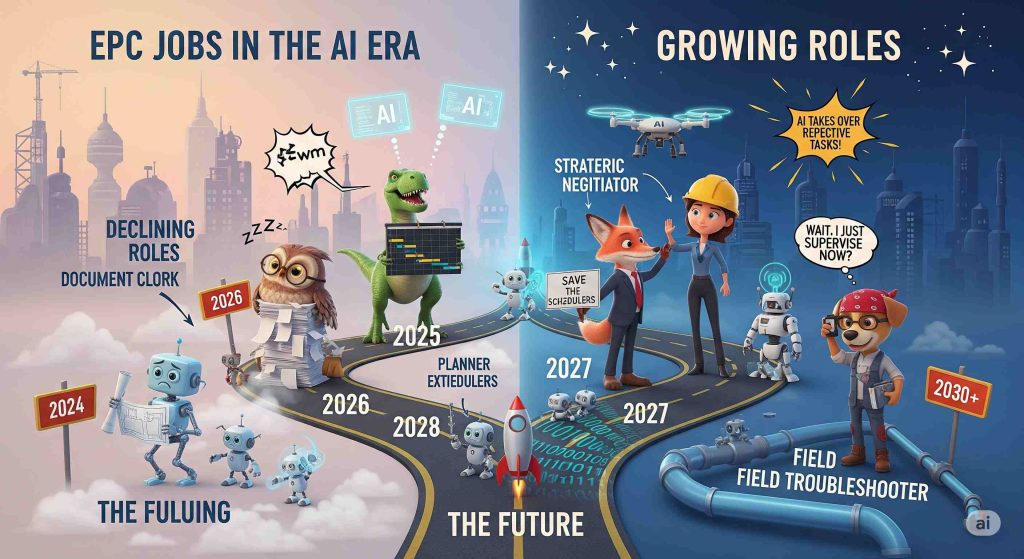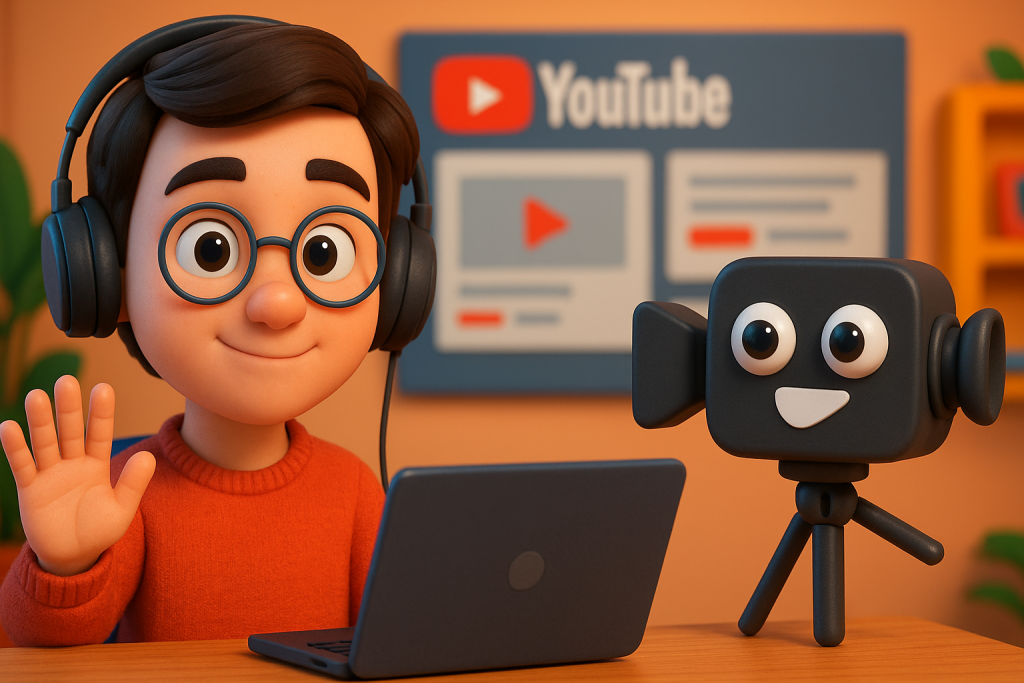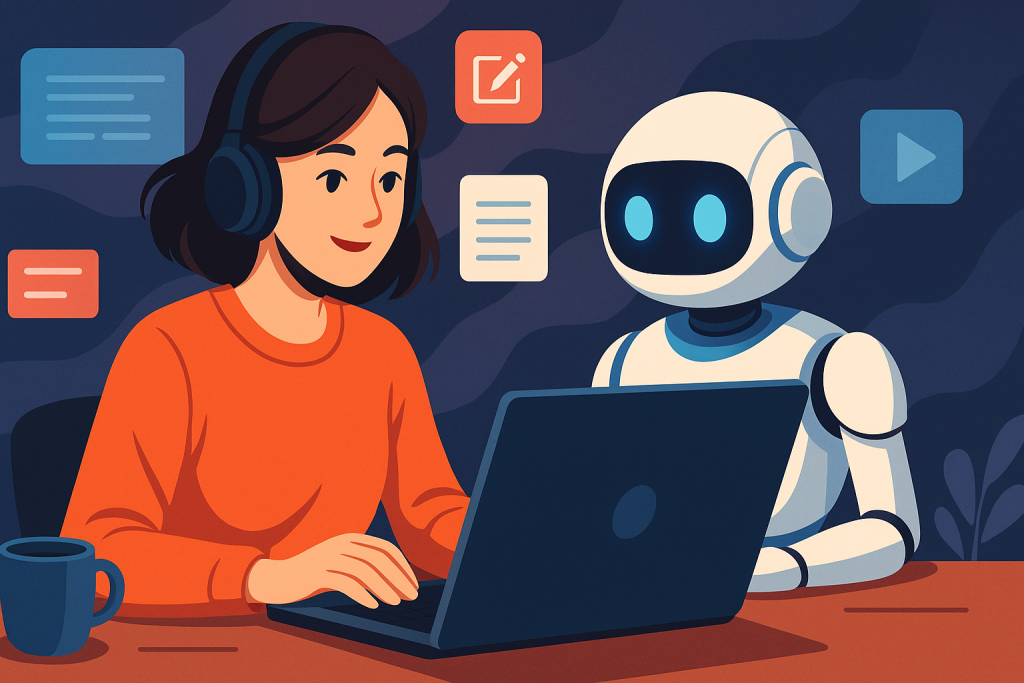The EPC World’s Next Big Thing: Getting Super Smart with AI
Hey, ever think about how the construction world works? You know, engineering, buying all the bits and pieces, then actually building stuff (that’s EPC)? Well, guess what? It’s about to get a huge shake-up, all thanks to something called Artificial Intelligence, or AI, and smart ways to get things done automatically.
The future of the EPC industry with AI is already unfolding. Engineering, Procurement, and Construction (EPC) companies are beginning to embrace artificial intelligence not just for automation, but for smarter workflows, faster coordination, and reduced project errors.
In future of EPC with AI, all those manual tasks we used to do – like constantly tweaking designs, finding documents, figuring out schedules, or even just buying bolts and pipes? Yeah, a lot of that’s gonna be handled by clever AI programs. And what does that mean for us? Fewer mistakes, things moving way faster, and projects finishing up ahead of time. Pretty cool, right?
This article’s all about how these new AI tools and “smart helpers” are truly changing the Future of EPC with AI game. They’re basically taking over the boring, repetitive jobs, which leaves us humans free to do the really interesting, high-level stuff. So, let’s peek at who’s doing what, how the whole process will flip, and what your work office might look like really soon.
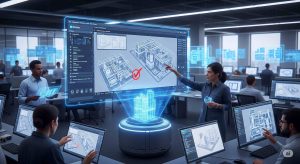 AI’s Stepping In: So, Who’s Doing What?
AI’s Stepping In: So, Who’s Doing What?
Think about how things are now versus how they’re shaping up with AI. Here’s a quick look at Future of EPC with AI and who’s getting a new kind of “help” from technology:
- Your Drafting Desk? It’s Changing! Remember all that detailed drawing by hand or even clicking away on CAD? AI-powered design programs can now just make 3D models from your ideas. If you’re a junior drafter, this means less repetitive clicking and more time checking AI’s work and thinking big picture.
- Chasing Documents? Forget It! Imagine an AI system that automatically sorts, tracks, and manages all your files. It can even pull out key facts from contracts or drawings. So, those folks who used to spend all day on document control and admin? Their jobs are getting a serious upgrade.
- Scheduling Headaches? Poof! AI planners can quickly figure out the best timelines for projects, even guess if there might be delays, and move resources around in real-time. For basic planning, you might not even need a person to do it anymore.
- Buying Materials? Let AI Do the Shopping! Smart AI programs can now pick the best suppliers, handle negotiations for prices, and send out orders based on exactly what your project needs. If you’re in low-level procurement, you’ll definitely see a big shift here.
- Checking Quality? AI’s Got the Rulebook! AI tools can scan designs and plans to make sure they follow all the industry rules (like ISO or ASME standards) much, much faster than a human can. That frees up engineers to focus on the really tricky problems that need deep thinking.
Bottom line? These AI helpers handle the dull, repetitive stuff. That lets us humans focus on the clever problem-solving, being creative, and making the big strategic calls.
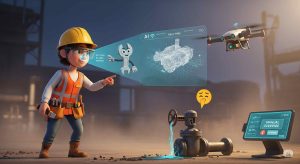 How the Future of EPC Industry with AI is Transforming Design Workflows
How the Future of EPC Industry with AI is Transforming Design Workflows
One of the biggest, coolest changes will be how AI helps designs adjust instantly. Can you believe it? No more waiting weeks for updates across different departments!
Let’s try a simple example. Say an engineer just makes a tiny change to how fast a pump needs to flow.
- Bam! Everything Updates: The AI immediately tweaks all the related drawings (like piping diagrams), flow charts, and even all the math behind the scenes.
- A Good Domino Effect: Mechanical models automatically adjust pipe sizes and how much support they need. Electrical AI quickly recalculates motor power. The procurement AI even re-sends quote requests to suppliers with all the new details.
- Documents Fix Themselves: Every single report, datasheet, or drawing? It gets updated automatically.
This whole process just eliminates that old problem where one small change created a massive headache and endless back-and-forth between teams. It’s truly like real-time digital teamwork.
Here’s how it generally works, step-by-step:
- AI Gets the Info: You feed it all the project details – what the client wants, rules, everything.
- Designs Appear: The AI starts whipping up tons of smart design ideas.
- Instant Rule Check: It immediately checks everything against all the industry standards and rules.
- Feedback Time, AI Style: Designs go out to clients or suppliers. Their comments come back, and the AI (using fancy language skills) actually understands them and makes the changes itself.
- Teams Sync Up: The AI makes sure all the different engineering teams (like the folks doing mechanical, electrical, civil work) see the updates and adjust their parts of the design right away.
- Shopping’s On Autopilot: AI picks suppliers, handles price talks, and orders materials, all perfectly timed with the project.
- On-Site Smarts: Even when building is happening, drones and smart sensors keep an eye on progress, making sure it matches the digital plan.
This whole setup? It cuts out weeks of those annoying email chains and all that manual updating. It’s a game-changer.
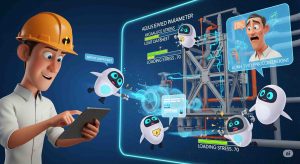 Role of AI Agents in Coordinating EPC Engineering Disciplines
Role of AI Agents in Coordinating EPC Engineering Disciplines
Forget those crowded cubicles and departments stuck in their own little worlds. The design office of the future? It’s going to look pretty different, more like this:
- No More Manual CAD! Engineers won’t be hunched over computers drawing lines. Instead, you’ll literally just tell an AI design program what you need, maybe even with your voice!
- Virtual Team Meetings: Teams will jump into virtual reality or augmented reality rooms to check out those cool AI-generated designs. How fun is that?
- AI Project Assistants: Smart AI helpers will quietly track all the project milestones, spot risks, and figure out who needs what resources. You get to supervise them, not do all the tiny details.
- Documents That Fix Themselves: Imagine your contracts, data sheets, and parts lists just automatically updating whenever you change something in the design. No more old, wrong papers!
- Digital Command Centers: Offices will have huge screens showing live project updates. It’s less about busywork and more about smart oversight.
Basically, a smaller, highly skilled team will be able to do what used to take a much bigger crew – and they’ll do it faster, with fewer mistakes, and with way more innovative ideas. Everything will be connected through the cloud, so everyone – suppliers, clients, and your team – is always on the same smart page.
 Jobs on the Horizon: What AI Means for EPC Roles
Jobs on the Horizon: What AI Means for EPC Roles
Okay, let’s talk about the big question: what about jobs? The EPC world is changing super fast because of AI. Some jobs might shift a lot, others will be totally safe, and a few… well, they might take a break. Here’s a quick idea of Future of EPC with AI and what might happen over the next five years:
Roles That Might Take a Break (2024–2029)
These are generally the routine, rule-based jobs that AI can handle really well:
- Document Controllers & Admins: AI systems are already great at sorting, tracking changes, and managing files automatically.
- Junior Drafters & CAD Technicians: AI can generate 3D models all by itself now. Your job shifts to checking AI’s work, not doing the basic lines.
- Manual Schedulers & Planners: AI tools are super good at figuring out timelines and spotting delays. No need for a human to do the basic planning.
- Low-Level Procurement Clerks: AI programs can pick suppliers, handle simple price talks, and send out orders.
- Routine QA/QC Checkers: AI can scan designs against all the rules much faster than a person can. Complex problem-solving is left for the engineers.
Roles That Will Change (AI Will Be Your Buddy!)
These jobs won’t disappear, but you’ll be working with AI, not just doing everything yourself:
- Design Engineers: AI will suggest awesome, optimized designs, but you still make the final decisions. Less manual drawing, more big-picture thinking and new ideas.
- Project Managers: AI will handle all the scheduling details, risk spotting, and reporting. You get to focus on talking to people, solving big strategic issues, and keeping everyone happy.
- Senior Procurement Specialists: AI will give you a list of potential suppliers, but you’re the one negotiating those big, tricky contracts. Dealing with things like sustainability goals still needs a human brain.
- Construction Supervisors: Drones and smart sensors will watch how things are going on-site, but you’re still the boss when unexpected problems pop up. AI might flag a safety risk, but you’re the one making sure everyone follows the rules.
Roles That Are Pretty Safe (For Now!)
These jobs need that special human touch – good judgment, creativity, and dealing with truly unique problems:
- Senior Engineers (Discipline Leads): AI can’t replace that deep, experienced wisdom needed to solve brand-new engineering puzzles.
- Client-Facing Roles: Building trust and creating custom proposals? That takes real human connection and emotional intelligence.
- Legal & Contract Specialists: AI can help draft legal stuff, sure, but understanding the law and negotiating complex deals? Still a human job.
- Field Engineers & Troubleshooters: When something totally unexpected goes wrong on site (like weird soil or a botched part), you need quick, adaptive human thinking.
- R&D and Innovation Teams: Coming up with brand-new materials, construction methods, or green solutions? That’s definitely beyond AI’s current capabilities.
A Quick Look at the Timeline (Next 5 Years)
- 2024–2025: Expect AI in drafting and auto-document control to really start booming.
- 2026–2027: AI scheduling and those smart procurement bots will become pretty common.
- 2028–2029: Full-on generative design will really take off, meaning some mid-level engineering roles will see partial automation.
- 2030+: Most repetitive jobs? Gone. We’ll likely see projects mostly run by AI with human teams doing the oversight.
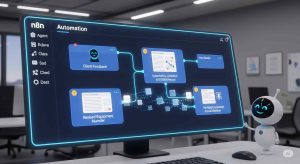 Why This Is a Game-Changer: The Big Wins
Why This Is a Game-Changer: The Big Wins
So, why are we doing all this? The benefits are seriously huge:
- Massive Time Saved: We’re talking about chopping off 60–80% of engineering hours. That’s a huge win!
- Fewer Mistakes: Less human error from miscommunication.
- Super Fast Decisions: Quicker calls on who to buy from.
- “Design Once, Use Everywhere”: Automation means your designs are instantly correct across all documents.
- More Fun Work for Engineers: It frees up engineers to tackle creative challenges and the really important stuff.
Final Thoughts
Look, the future of EPC with AI isn’t about replacing engineers; it’s about giving them amazing, super-powered AI tools. It’s about taking away all that annoying grunt work and making decisions happen way faster. Imagine your entire design fixing itself automatically when you change just one little number. That’s not some sci-fi dream anymore – it’s actually happening right now.
If companies jump into this change now, they can save tons of time, cut costs, and seriously stay ahead in an industry that’s getting smarter every single day.
Ready to dive in? Want to see how you can automate your workflow or build an AI helper for your EPC team? Let’s chat. Book a free consultation at h4hustle.in
Check out some tools you can start using now (many are free or low-cost):
- Autodesk Forma: Great for AI design ideas (Freemium)
- ChatGPT / Claude: Super handy for drafting specs, emails, or documents (Free)
- Zapier / Make: Perfect for setting up automatic tasks between different apps (Freemium)
- Google Colab: Good for AI coding experiments and calculations (Free)
- Notion AI: Helps a lot with documents and keeping track of things (Freemium)
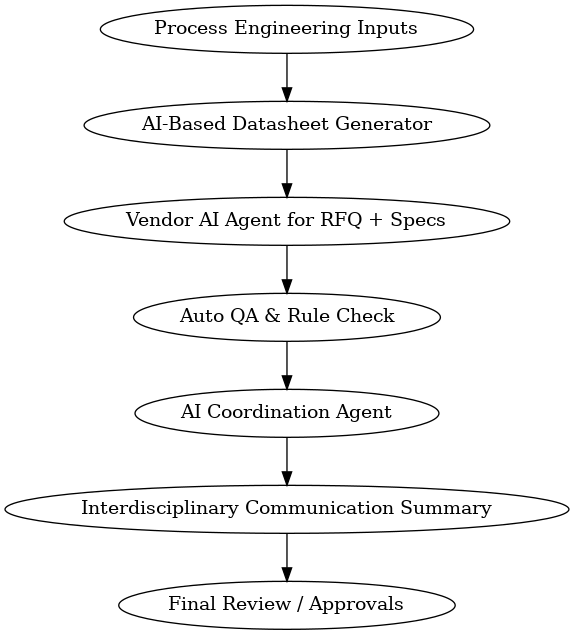
FAQ
FAQ 1: What is the future of EPC with AI?
Answer:
The future of EPC with AI is all about intelligent automation—AI tools will handle datasheets, interdisciplinary coordination, vendor communication, and design updates in real-time. This reduces manual errors and improves project efficiency.
FAQ 2: How will AI replace manual roles in EPC design?
Answer:
AI will automate repetitive tasks like data entry, design validation, RFQs, and version control. AI agents will also monitor changes across departments, making adjustments automatically and reducing the need for constant human supervision.
FAQ 3: Can AI handle changes across engineering disciplines?
Answer:
Yes, in the future of EPC with AI, connected AI agents will detect changes in one department (e.g., equipment size) and adjust related calculations, documents, and layouts in other departments instantly, ensuring seamless updates.
FAQ 4: What AI tools are used in EPC workflows?
Answer:
Popular tools include ChatGPT for documentation, AutoCAD with AI plugins, AI-driven P&ID generators, and automation platforms like Zapier or Make.com for process integration. These tools are central to the evolving future of EPC with AI.
FAQ 5: Will AI eliminate human jobs in EPC?
Answer:
Not entirely. While AI automates many tasks, human engineers will focus more on strategic decisions, innovation, and oversight. The future of EPC with AI is more about augmentation than replacement.

